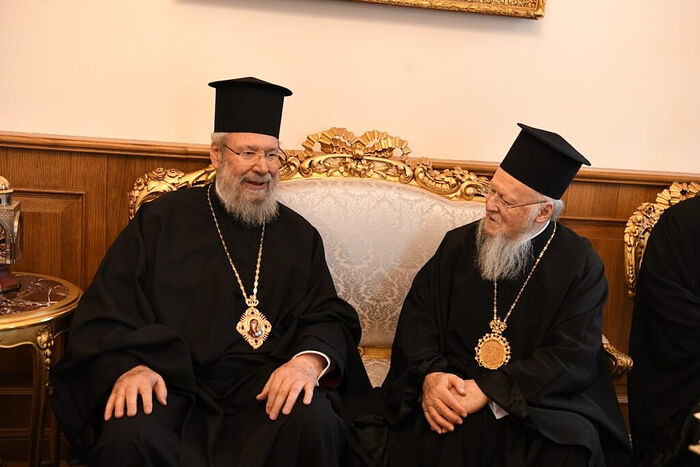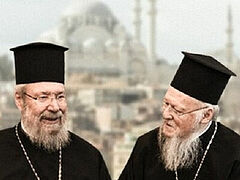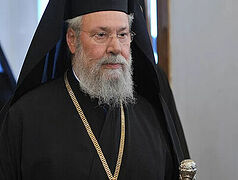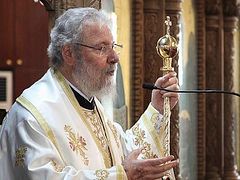Nicosia, Cyprus, October 29, 2020
On October 23, Archbishop Chrysostomos of Cyprus sent a letter to Patriarch Bartholomew of Constantinople in which he explains his stance on the Ukrainian issue and why he has decided to recognize the “Orthodox Church of Ukraine,” which is recognized as schismatic throughout the Orthodox world.
As OrthoChristian reported, Abp. Chrysostomos first commemorated Epiphany Dumenko, the schismatic primate, the next day, Saturday, October 24, sending shockwaves throughout the Church of Cyprus and beyond. Today, the Archbishop’s letter was published on the official Church of Cyprus website.
The Archbishop’s main points are that he is dedicated to serving the Patriarchate of Constantinople, and that because the Church of Russia and others that support its position on the Ukrainian issue have appointed bishops outside the boundaries laid out in their tomoses, they are unjustified in protesting Constantinople’s encroachment in Ukraine.
While the Cypriot primate earlier met with several primates of the Local Churches on the Ukrainian issue, he begins his letter by noting that he is unable to continue these meetings due to the coronavirus pandemic, his poor health, and the chemotherapy he underwent. However, he publicly announced last year that he stopped these visits because they angered Patriarch Bartholomew of Constantinople, who believes the primates should not discuss the matter, but only accept the will of the Ecumenical Patriarch.
The neutral position he had been externally holding was for the good of Orthodoxy and to help the “ever-tested Ecumenical Patriarchate,” the Archbishop writes. However, seeing the fruitlessness of his efforts, and “after much prayer and reflection,” he decided to commemorate Epiphany Dumenko.
Patriarch Theodoros of Alexandria also explained last year that he decided to go back on his support for the canonical Ukrainian Church under His Beatitude Metropolitan Onuphry of Kiev and All Ukraine and commemorate Dumenko after a time of prayer and reflection. Both primates made this decision apart from their respective Holy Synods.
Further, the Synod of the Church of Cyprus took a neutral stance to serve as an example for the other Local Churches, Abp. Chrysostomos writes. It is numerically small, but also apostolic, and the Church of Cyprus received its autocephaly at the Third Ecumenical Council only in order to be free of the “nuisances” of being under the Church of Antioch, he adds.
He continues by noting that the Church of Cyprus is well organized and maintains good contact with its people, through the services, catechetical meetings, camps, social and spiritual activities, and so on. There are roughly 900,000 Cypriots in Cyprus, and just as many abroad, and the Archbishop is pleased with how the Patriarchates of Constantinople and Alexandria and the Church of Greece take care of these Cypriot expatriates. The Church of Cyprus only sends clergy to take care of Cypriot communities when requested by the Local Church where the community resides, he writes.
No other Local Church can be said to have the same percentage of expatriates, Abp. Chrysostomos emphasizes, so the Church of Cyprus should serve as an example of respect for ecclesiastical institutions to be imitated by the other Local Churches.
The Archbishop has represented the Cypriot Church at pan-Orthodox conferences for 30 years and is well aware of how the Local Churches view the subject of expatriates, he writes, and he regrets that any decisions that have sometimes been made have never really been accepted. He points to the example of the Church of Serbia, which appointed a Metropolitan in Europe and another in Austria soon after the Council of Crete in 2016, thus going against the decrees of the council.
Thus, “the growing controversy over the alleged intervention of the Ecumenical Patriarchate in Ukraine and the granting of a tomos of autocephaly,” is unjustified, because the “noisy” ones are the first to violate the territory of others.
With the exception of the four Churches of the Middle East—Antioch, Alexandria, Jerusalem, and Cyprus—all the Local Churches received their autocephaly after the 15th century in a tomos from Constantinople that established their borders, Abp. Chrysostomos writes (though, in fact, the Church of Georgia received its autocephaly from Antioch in the first millennium—O.C.]. And every Local Church should stay within these borders laid out by their respective tomoses, and not interfere by ordaining bishops in the territory of other Local Churches.
In the Archbishop’s view, the Russian Church has interfered in other Local Churches—Poland, Ukraine, Georgia, Romania—and thus it has no right to complain about interference coming from the Patriarchate of Constantinople, the Cypriot primate writes, noting that he made this argument to the other primates he met with.
If Local Orthodox Churches would stay within the bounds of their tomoses and serve their appointed flocks with all their hearts and souls, they would become an example for other confessions.
Abp. Chrysostomos states that this has always been his position, and that he maintained a neutral stance on Ukraine in order to instill their same mindset in all the primates and to play a conciliatory role for the sake of unity.
Should his health improve, the Archbishop “will always be at the disposal of His All-Holiness to undertake any mission.”
The Church of Cyprus will continue to offer its support to Constantinople, for the good of the Orthodox Church, Abp. Chrysostomos promises.





